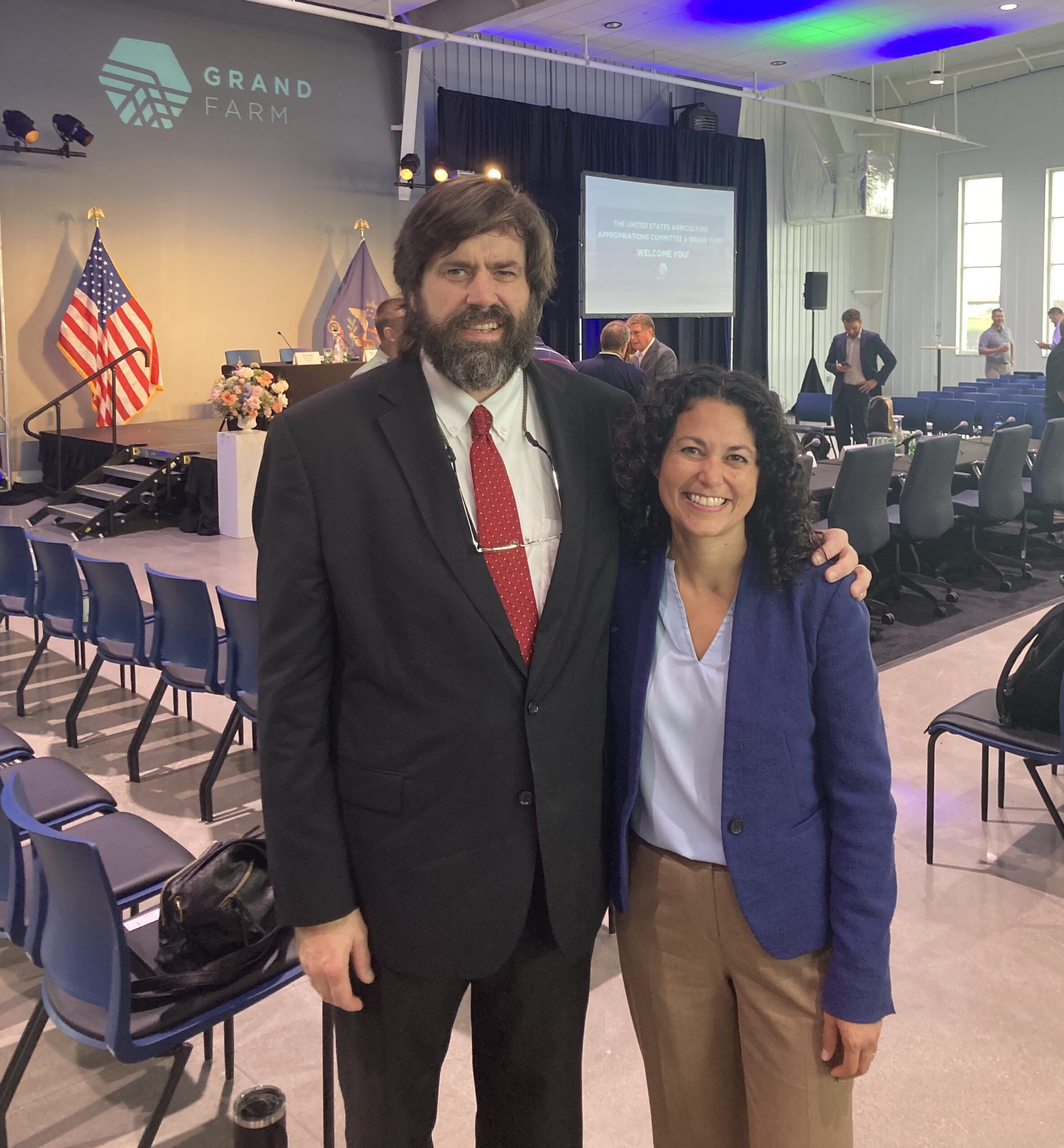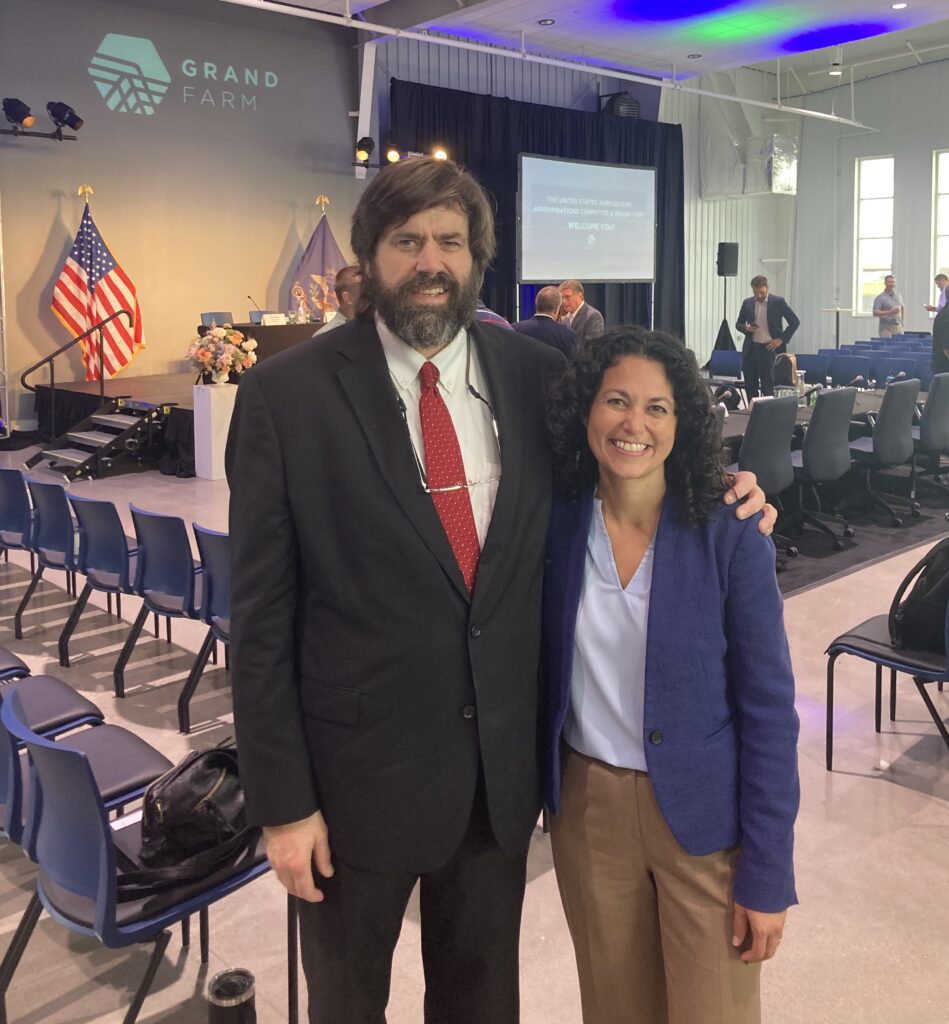By Drew Viguet
National Agricultural Law Center
U of A System Division of Agriculture

WHEATLAND, N.D. — The evolving arena of research and technology impacts the entire ag industry, from pesticides to trade and beyond, and National Ag Law Center Director Harrison Pittman has seen those impacts over time.
Over the summer, NALC Director Harrison Pittman was invited to testify during a hearing from the U.S. Senate Committee on Appropriations subcommittee on Agriculture, Rural Development, Food and Drug Administration, and Related Agencies. The Aug. 15 open session, “Perspectives on the Future of Agriculture Research and Technology,” was held at the Grand Farm Innovation Campus in Wheatland, North Dakota.
Pittman testified on a panel before Ranking Member Sen. John Hoeven (R- North Dakota), Sen. Amy Klobuchar (D- Minnesota), Sen. Tina Smith (D- Minnesota) and Sen. John Boozman (R- Arkansas). He was joined by panelists Greg Tehven, co-founder and board chair at Grand Farm, Greg Lardy, Joe and Norma Peltier vice president for agriculture at North Dakota State University, Josh Gackle, president of the American Soybean Association, Harold Wolle, president of the National Corn Growers Association, and Jay Debertin, president and chief executive officer of CHS.
In his testimony, Pittman noted how the NALC’s mission, which is to serve as the nation’s leading source of agricultural and food law research and information, has had to adapt to encompass more than ever before.
“The function that we were originally created for continues today, but the issues have grown and they have expanded in so many different ways,” Pittman said.
Pittman said that pesticides is the area that has changed the most in his over 20 years in agricultural law.
“And if ever there were good ole days in pesticide registration, I think they’ve ended,” he said. “And I don’t think that it will get easier anytime soon. I think the changes are likely long-term.”
A recording of the panel featuring Pittman is available online.
Senator Hoeven inquired of Pittman and Debertin about what they recommend be done in the arena of trade, to which Pittman responded, “More.”
“Whatever we’re doing is never enough,” he said. “If you were to ask me what I think are the top say two or three issues in the ag industry going forward, trade is always going to be a one, two or three.”
Pittman noted that it’s a challenging environment, and that it is difficult to get long-term, multi-country trade agreements completed. But, it’s important to keep working at getting trade deals done.
“It’s obvious that it’s a key part of long-term economic viability of the ag industry in the United States,” he said. “And so, whatever we do, regardless of who is in the White House, regardless of who controls Congress, it’s always ‘more’ in my view.”
Boozman, ranking member of the U.S. Senate Committee on Agriculture, Nutrition, and Forestry, expressed gratitude for Pittman’s expertise “as we confront some of the legal implications of applying new and emerging technologies in agriculture.” His full opening statement can be viewed online.
U.S. Department of Agriculture officials also testified at the event, as a separate panel featured Xochitl Torres Small, Deputy Secretary of Agriculture, and Dr. Chavonda Jacobs-Young, Undersecretary for Research, Education, and Economics and USDA Chief Scientist. During their panel, both spoke highly of the NALC and its value to stakeholders.
Torres Small noted that partnerships such as the one between USDA and NALC are significant in getting valuable agricultural information where it needs to go. The NALC receives federal funding from USDA National Agricultural Library, a part of the USDA Agricultural Research Service.
“I can’t help but speak about the great relationship that we have with Harrison Pittman,” Torres Small said. “And specifically, when it comes to how useable the [NALC’s] information is. The direct relationship with cooperative extension and providing that legal advice to cooperative extension is crucial, because it’s information in the hands of farmers.”
She also noted that information will be increasingly important, as recent Supreme Court decisions are going to impact how USDA is able to promulgate regulation.
“And working with the [NALC] is going to be fundamental to identifying how to respond and make sure that our decisions are appropriate and defensible in courts of law,” she said.
Referencing her conversations with the younger generation, Torres Small mentioned that a large portion of students and farmers are thinking about going into agricultural law, seeing it as fundamental to doing the work on the ground. She noted that having a resource like the NALC is crucial to training not just the lawyers of the future, but the farmers of the future who have that background.
A recording of the panel featuring Torres Small and Jacobs-Young is available online.
A recent webinar in the NALC’s “Growing Careers” series was presented by Deputy Secretary Torres Small, where she discussed her background, path to and through law school, career and professional advice, and more. A recording of the webinar is available online.
